- Home
- Scott Westerfeld
Mirror's Edge Page 2
Mirror's Edge Read online
Page 2
The Rusties were always at their cleverest when inventing ways to kill people.
“It’s called a variable blade,” Rafi says, beaming. “I know you’ll hate not having a pulse knife. Happy birthday, little sister.”
“Thanks.” When I open my hand, the plastic slithers around my fingers again, re-forming the innocent-looking rings. “I don’t have anything for you.”
She shrugs. It was always this way. I’ve never had money to buy presents, and Rafi possessed everything she wanted.
“Just come back to me,” she says. “That’s my present.”
“Don’t worry, Rafi. They won’t catch me.”
She gathers me into a hug.
“Not only that, little sister. I mean come back to me.”
And there, in the warmth of her arms, I realize that she means changing my face back to hers.
We reach the drop height just as the sun sets, turning the thin arc of atmosphere from blue to blinding white.
Below us, it’s night already, the lights of Shreve visible in the distance. We aren’t dropping from directly overhead. We’re falling at an angle, letting our wingsuits and the winds of the jet stream carry us across the border.
The airship has expanded as we’ve risen, two hundred meters across now. But we’re invisible from the ground. The ionosphere around us reflects most radar waves, and everything we’re carrying is made of ceramics and plastic. No metal to ping Shreve’s air defenses.
The free cities have provided us with their best tech—hidden weapons, this airship, even cloud-seeding stealth craft to increase the chance of dust-clearing rain while we’re in Shreve. The cities may not care about Boss X, but anything that hurts my father strengthens the alliance against him.
Zura, one of Col’s soldiers and the official commander of this mission, flashes her wrist lights to get our attention. She holds up two fingers.
Two minutes till we drop.
A trickle of dread starts in my stomach. By reflex, I reach for my feels, but of course they’ve been gone for weeks. Up here in the void, I’m stuck with my own emotions.
It’s headspinning, the idea of falling for twenty solid minutes. There’s some animal part of me that doesn’t believe I’m really this far above the earth. There’s no sense of scale up here—nothing visible below but the city and a few winding rivers glinting in the moonlight.
Col waves a hand. I smile at him, trying to look brave.
He unsnaps the shoulder pocket of his pressure suit and pulls something out … a flower.
He hands it to me, mouthing two words.
Happy birthday.
I hold it close, staring through my helmet visor. It’s a single shaft of the goldenrod that grows around my sister’s mountain hideout. Its yellow petals glitter with ice against the setting sun.
The altitude has frozen it solid.
I want to tell Col that I’ve never seen anything so beautiful. That it’s the first birthday present anyone besides my sister has ever given me.
Col gestures with his gloved fingers, a flicking motion.
When I bat the flower, it shatters into a galaxy of tiny golden stars. The sparkles spread out, floating uncertainly around us for a moment before they start to fall.
I take Col’s hand, laughing. “How long have you been planning this?”
“All week,” he says. “I knew it would shatter—like using liquid nitrogen! It’s minus a hundred and forty up here!”
“That’s … cold.”
He cracks up at this. His surge-altered laugh sounds wrong, but I’m pleased that Col loved his gift as much as I did.
“Hard to believe it’s a warm spring evening down there,” he says.
I look down at my father’s city. The floodlights around the border look white and cold.
“Fall safe,” I say.
“You too, Islyn.”
A pulse of strangeness—Islyn is my Shreve name.
In twenty minutes, I have to become someone else. Every word, every gesture, every second.
“You too, Arav,” I reply in kind, then realize something. “Wait. I haven’t missed your birthday, have I?”
“Don’t worry, Frey,” he says. “I’ll remind you.”
The sound of my own name settles me. But I can’t help wondering, how do people find out each other’s birthdays?
Do you just ask?
What am I supposed to get the boy I love?
Another flash of light comes from Zura. Col lets go of my hand to check the straps of his wingsuit harness.
Zura counts down on her fingers.
Three, two, one …
On zero, the nanofilaments of the airship above us disassemble all at once. The huge black shape disintegrates, imploding into swirls of smoke, a dark ghost vanishing.
The grip of my harness goes slack—but this high up, there’s not enough atmosphere for the rush of wind. My stomach knows I’m in free fall, but my fellow commandoes seem to be hovering in the stillness around me.
I breathe slow and deep, letting my training kick in. My arms and legs spread out, stretching out the membrane of the wingsuit, like I’ve done a hundred times in practice.
But this isn’t anything like the simulations.
Something huge has filled my body—a primal, terrifying knowledge that nothing is holding me up.
I feel weightless, motionless. As if time is frozen in these moments before returning to my father’s city.
Sixty kilometers left to fall.
A month before the drop, Zura tells us all the ways we can die.
“Hitting the ground at ten meters per second will usually kill you,” she says. “Terminal velocity for a human body is five times that speed.”
“Terminal,” I repeat. “Is that when you definitely die?”
Zura shakes her head. She waves a hand, and a little person appears in the airscreen over the conference table. Belly down, arms out—the skydiving position. Its clothes flutter as if wind is rushing past.
“Terminal velocity is the top speed a human can fall. At fifty meters a second, air resistance equals gravity—you stop accelerating. But it’s fast enough to liquefy your insides if you hit the ground.”
“Liquefy?” Col says. “Are you trying to scare us out of this mission, Zura?”
“You, sir? Never.”
Col shrugs. “Cats can survive falls at terminal velocity.”
“Well, maybe you have nine lives.” Zura’s smile flashes in the light from the airscreen. “I’ve stopped counting.”
We’re in the Spider Room, deep in Rafi’s mountain. It’s us three, plus Yandre and X’s old friend, Boss Charles. The rescue mission is still in the planning stage, known to only a handful of people.
I haven’t even told my sister yet.
Zura gestures again, and the little person on the airscreen sprouts membranes between legs and arms, like a flying squirrel.
“With wingsuits, we’ll fall much slower—ten meters a second. That’s still deadly fast, though, and we’ll be moving forward three times that speed.”
Pulsing arrows appear around the little person, showing airflow across the wings. Terrain rushes past below.
“So we die if we hit anything,” Yandre says. “Even a bird.”
“But at least we won’t be liquefied,” Col mutters.
“More like splattered.” Zura waves the image aside. “But it’s the only way to get into Shreve without being seen.”
Boss Charles speaks up. “What happened to walking?”
“The dust would spot us.” Zura waves a hand, and familiar images of surveillance dust appear. “The air in the city of Shreve is full of nano-scale cams, microphones, and transmitters. Every word, every action, is recorded and uploaded to—”
“I know about dust,” Charles breaks in. “But I thought you solved that.”
Yandre nods. “Our spy in Shreve is creating identities for us. But real citizens are recorded from the day they’re born, and you can’t fake a whole life�
��s worth of data. If the city AI flags us as suspicious, anyone looking closely at our files will know we’re bogus. We have to be model citizens from the moment we arrive.”
“In Shreve,” I say, “model citizens don’t walk across the border.”
“Do model citizens fly?” Charles asks.
Yandre turns to the airscreen again. “Nanocams are tiny—we’ll leave them spinning in our wake. We’ll be a glitch!”
“And the city AI won’t notice seven glitches crossing the border?” Charles asks.
Yandre shakes their head. “The dust is disrupted all the time by wind, rain, flocks of birds. It isn’t designed to detect humans flying without hoverboards. My guess is, it’ll ignore us completely.”
Col and Boss Charles frown, like they don’t want to rely on guesses.
For me, though, the thought of being invisible in my father’s city, even for a few seconds, is thrilling.
Growing up, the dust surrounded me, recording every lesson with my tutors, every murmur in my sleep. I breathed it for sixteen years. It settled on my food and in the pores of my skin, glittering in slants of sunlight, ever-present. It made the sky a different color.
At night, I dreamed of being free from it.
Every city has some kind of surveillance; even privacy-worshipping Paz uses traffic sensors and retina locks. But the dust in Shreve isn’t in the air to prevent crime or accidents. The city AI watches everyone, its algorithms always searching for antisocial behavior.
While we’re in my father’s city, we’ll have to watch our words, actions, gestures. Even the motions of our eyes.
Of course, I’ve spent my whole life pretending to be someone else. This is the mission I was born for.
“Okay,” Col says. “So wingsuits are the way in. But how do we land without splattering?”
Zura waves another image onto the screen.
“That’s the scary part,” she says.
After a few minutes of falling, we reach the denser stratosphere.
A wind starts to build. My wings flutter, then fill. On the readout in my helmet, the numbers ticking off our descent begin to slow. Buffeted by currents of air, we arrange ourselves into a V formation, angling toward Shreve.
Zura takes the point, with me, Col, and Yandre on her right. Boss Charles is on the left wing, along with two commandoes I’ve never fought beside before.
One is Riggs, who was once the boss of Rafi’s crew. When my sister took over, she somehow managed to keep Riggs as a second-in-command. Riggs is like a battle-worn version of Tally Youngblood, fierce and charismatic, wearing her scars proudly. Even now, surged into a smooth-faced citizen of Shreve, she looks dangerous.
She’s the only commando who doesn’t know my real name.
The last member of the team is Lodge, here to keep an eye on us for the free cities. He arrived from Diego already surged into his Shreve identity, so we don’t know his real face.
He’s a Special, like Zura, his strength and speed enhanced beyond any normal human’s. But muscles and reflexes won’t matter much if we get into a firefight with the whole Shreve army.
Our best chance is if no one knows we were here till after we’re gone.
At forty kilometers up, the locator in my helmet display shows us still a hundred klicks from Shreve, which is nervous-making. If the wind doesn’t carry us all the way to the landing site, there aren’t any hoverboards or parachutes to fall back on.
We’ll splatter.
The minutes pass. We keep falling.
Thirty kilometers, then twenty, the air is growing denser, the wind stronger, till it’s like a mag-lev roaring past. Our wingsuits start to angle our fall toward Shreve.
From eighteen klicks’ altitude, we see a suborbital taking off from Orlean. It breaches the clouds and arcs silently toward Tokyo on a bright lance of flame.
At ten thousand meters, we finally catch a real tailwind—the subtropical jet stream. The terrain is visibly sliding past beneath us, and I can make out the familiar shape of Shreve ahead. The border is outlined by searchlights, the greenbelt dark, and the city center glowing with hover traffic.
Beside me, Col is testing out his wingsuit, altering his course with waggles of his fingers. He wavers back and forth through the air, then slips up beside me to take my shoulder.
“How’s it going, Islyn?”
“Uh, you know,” I yell over the wind, “plummeting!”
His mad laughter buzzes through the suit connection.
“You can turn off your oxygen now,” he shouts. “Just for a minute—the air’s still pretty thin.”
“Why would I do that?”
“The air’s different at every level. I could smell the ozone layer!” His wind-rippled shoulders shrug a little. “At least, I convinced myself I could.”
“Regular oxygen’s fine with me,” I yell.
Col starts to respond, but Zura is furiously flashing her lights at him.
He gives me a grin, then zooms back into formation.
We continue to fall, Zura keeping us on course. My helmet display shows our glide ratio climbing. Soon we’re slipping forward through the air three times as fast as we’re descending.
I’m getting used to this. Like I was born to fly.
Or born to fall.
One kilometer from the ground, my helmet display dims. The forest is zooming past below, and I glimpse moonlit streams and waterfalls, the somber lights of Shreve housing complexes.
At last I have a sense of my own speed, faster than any hoverboard or jetpack—but still slower than a diving peregrine falcon, Col told me yesterday.
At least falcons know how to stop themselves.
One minute from the landing zone, an alarm sounds. Time to spread the formation out so we don’t all hit the lake too close together.
It’s not exactly a lake anymore. Ten days ago, a flurry of nanos landed on it, disguised as snow. Like us, they fell from the stratosphere, each snowflake breaking into millions of machines.
Since that night, the nanos have been reconfiguring the H2O molecules in the lake. It still looks like water from above, but it’s been transformed into carefully calibrated layers of crash gel. Foamy on the top, then denser and denser, designed to gradually arrest our momentum as we dive through them.
Unless we come in too steep and break our necks. Or too shallow, and bounce off the surface like a flung rock and crash into the trees along the shoreline. Or we could hit a fish that woke up early from hibernating in the cold depths, swimming up to suffocate in the foam.
There are a dozen other ways this can go wrong, but I’ve forgotten most of them.
With ten seconds left, my display says I’m right on target. I stop watching the numbers and focus on the rushing world around me.
This feels like real flying—the roar of the air, the parkland hurtling past beneath me, the tick of bugs splatting against my helmet.
Like a wind spirit, invisible to my father’s eyes and ears.
The lake shimmers ahead, alight with the moon.
Growing bigger …
I press my hands together like a diver.
My fingers smack against the surface, and the world transforms—I’m crashing through a sudden tempest, a jet-engine roar filling my helmet. Twisting downward into the denser layers, the pressure builds like a fist around me.
But the crash gel is working. My bones haven’t snapped. My suit hasn’t ruptured. I didn’t hit a bird in the air or a windblown branch floating on the surface.
I’m not splattering.
My momentum slows, the rumble in my helmet subsiding. The weight of my half-depleted oxygen tanks pulls me gently down to the bottom. It’s normal water down here, cold and heavy around my pressure suit. My feet settle onto soft mud.
The rushing, hurtling world has downshifted to slow motion. From a diving hawk, I’ve turned into a sluggish creature slinking along the bottom of the sea.
The cold water starts to leach the feeling from my hands and feet.
I check my oxygen tanks—eighteen minutes left—and orient myself with my helmet display. We’re gathering on the western shore of the lake.
I start walking through the cold.
I’m home at last.
Three weeks before the jump, doctors cut us into pieces and put us back together.
It’s serious surgery, beyond the skills of any medic in my sister’s rebel army. So Diego sends a military craft with bone-rattling jet engines to collect us commandoes.
Col and I sit next to each other on the plane, making jokes about how boring our new faces are going to be. Shreve surge is famously art-missing, as if my father just wants everyone to look the same.
That’s when it starts to sink in—I’m going to be a different person tomorrow.
When we land in Diego, a cheery guide takes us on a tour. We see the infinity waterfalls, a wetlands reconstruction, the EverCarnival. Like tourists, not commandoes here to have our skin peeled off, our bones broken and remade.
As night falls, they stick us into surge tanks.
Claustrophobia hits as my tank starts to fill with fluid. I press my palms against the transparent sides, my teeth gripping the breathing mask.
They’re going to take away my face.
Our face.
The happy-making chemicals fill my blood, and my panic turns soft and fuzzy, like a warm rain is soaking me.
And then I’m dreaming pretty dreams.
The next morning, I come out of the tank raw-skinned, unsteady on my feet. My old clothes don’t fit, and my voice sounds wrong in my ears. This new body feels like some clumsy costume a kid would wear, a shell wrapped around my real self.
Breathing feels wrong too.
There are no mirrors in the room, not even shiny surfaces, and the psych doctor warns me not to look at my reflection until I’m used to this body. Camo-surge can be confusing the first time you get it.
She guides me to a recovery room and leaves me there—soothing music, orange juice, a huge picture window. The view is Diego’s famous climbing wall, formed from a single sheet of vat-grown diamond, perfectly transparent. I suppose it’s beautiful, but to me the climbers look like spiders swarming a fragile sheet of glass.

 Uglies
Uglies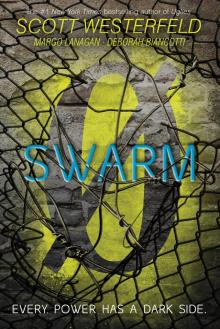 Swarm
Swarm Pretties
Pretties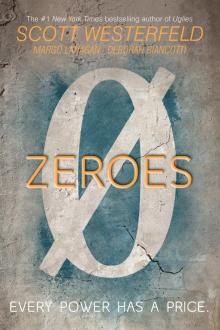 Zeroes
Zeroes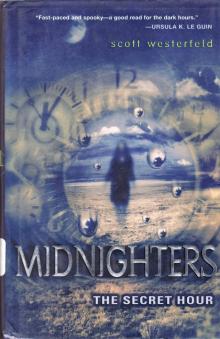 The Secret Hour
The Secret Hour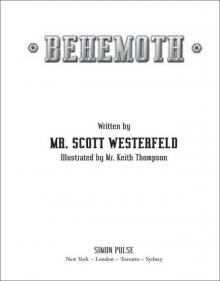 Behemoth
Behemoth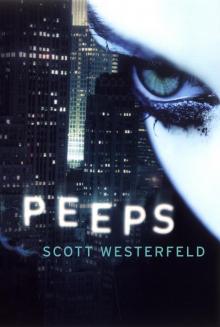 Peeps
Peeps Specials
Specials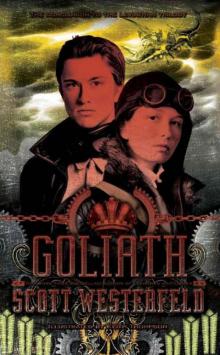 Goliath
Goliath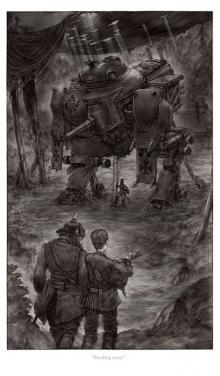 Leviathan
Leviathan Extras
Extras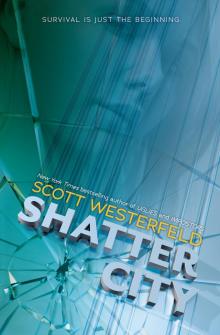 Shatter City
Shatter City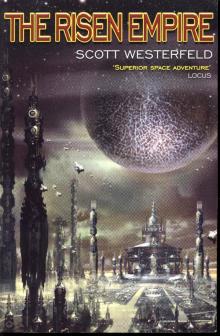 The Risen Empire
The Risen Empire Touching Darkness
Touching Darkness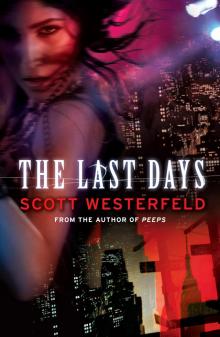 The Last Days
The Last Days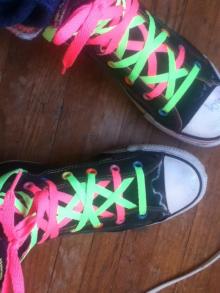 So Yesterday
So Yesterday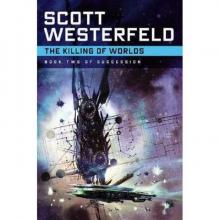 The Killing of Worlds
The Killing of Worlds Afterworlds
Afterworlds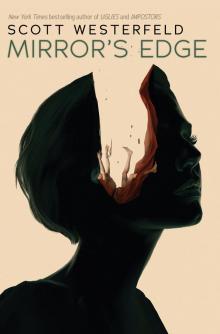 Mirror's Edge
Mirror's Edge Evolution's Darling
Evolution's Darling Blue Noon m-3
Blue Noon m-3 Touching Darkness m-2
Touching Darkness m-2 Impostors
Impostors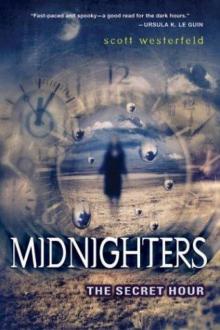 The Secret Hour m-1
The Secret Hour m-1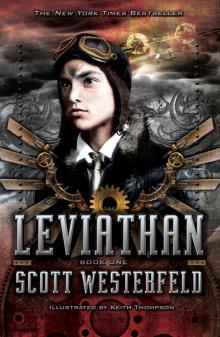 Leviathan 01 - Leviathan
Leviathan 01 - Leviathan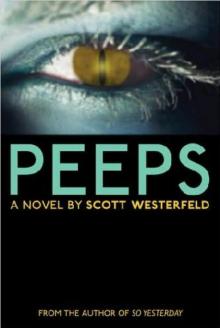 Peeps p-1
Peeps p-1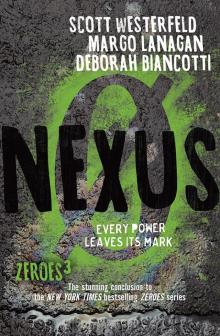 Nexus
Nexus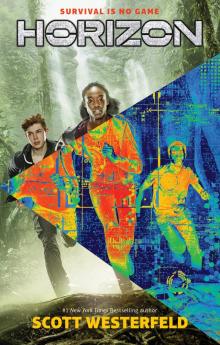 Horizon
Horizon Bogus to Bubbly
Bogus to Bubbly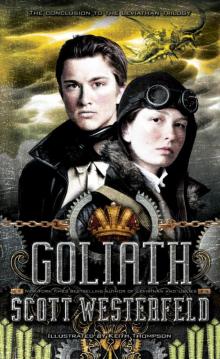 Goliath l-3
Goliath l-3 The Last Days p-2
The Last Days p-2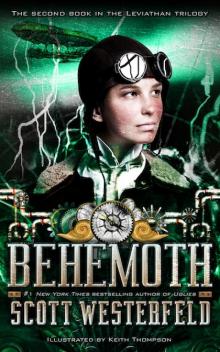 Behemoth l-2
Behemoth l-2 Stupid Perfect World
Stupid Perfect World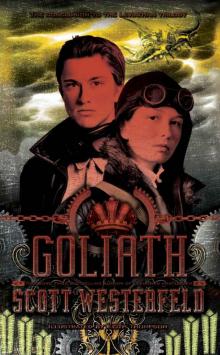 Goliath (Leviathan Trilogy)
Goliath (Leviathan Trilogy)